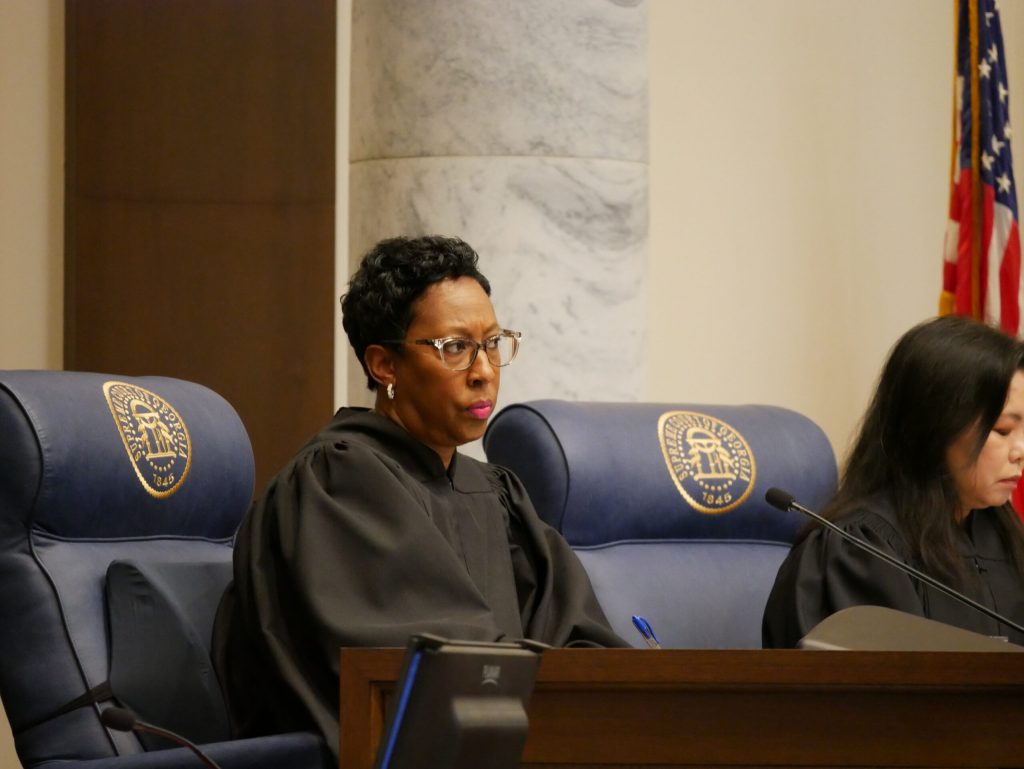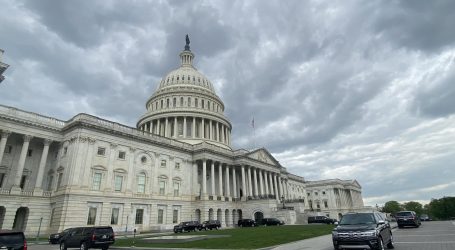Georgia Supreme Court upholds state’s six-week abortion ban, returns challenge to lower court

Justice Verda M. Colvin, who penned Tuesday’s opinion for the majority, listens to oral arguments back in March. Jill Nolin/Georgia Recorder
This story was updated at 4:15 p.m. on Tuesday, Oct. 24, 2023.
Attention has shifted back to the Fulton County courthouse after the Georgia Supreme Court rejected an argument that state lawmakers should have to pass abortion restrictions in the post-Roe world.
A group of health care providers and abortion rights advocates had argued that parts of the 2019 law should be thrown out because they were passed before the U.S. Supreme Court overturned Roe v. Wade in 2022 and left the issue for states to decide.
Fulton County Superior Court Judge Robert C. I. McBurney agreed, ruling the restrictions “plainly unconstitutional” when they were created.
But with a 6-to-1 ruling Tuesday, the state Supreme Court disagreed. The opinion resolves a narrow legal issue that was just one part of the still-active legal challenge in Fulton County, which also argues Georgia’s strict abortion restrictions violate the state constitution’s rights to privacy and equal protection.
McBurney held a two-day trial to hear arguments and testimony last fall and has not ruled on other parts of the case.
The state law bans most abortions after fetal cardiac activity is detected, which is usually at about six weeks and before many women know they are pregnant.
The ruling, which can be found here, was released Tuesday, nearly seven months after the court heard oral arguments.
Writing for the majority, Justice Verda M. Colvin, who was appointed to the court in 2021 by Gov. Brian Kemp, wrote that McBurney’s ruling relied on a “faulty premise.”
The U.S. Constitution, Colvin noted, is the same text it was when Gov. Brian Kemp signed the six-week ban into law in 2019. It is just the U.S. Supreme Court’s interpretation of the document that has changed, she said.
And Colvin said the courts must now look to the U.S. Supreme Court’s 2022 ruling for guidance, even if the law in question pre-dates the ruling that upended a nearly 50-year-old precedent protecting abortion access.
“The United States Supreme Court does not supply meaning to, and has no power to change, the independent and fixed meaning of the United States Constitution,” Colvin wrote.
“And we have no authority to defy now-controlling United States Supreme Court precedent interpreting the United States Constitution when determining whether the LIFE Act violated the Constitution at the time of its enactment. The dissenting opinion is wrong to suggest otherwise,” she added.

Georgia Supreme Court Justice John J. Ellington listens to oral arguments in March. Jill Nolin/Georgia Recorder
John J. Ellington, who was elected to the court in 2018, was the lone dissenting justice. Two justices were not part of the opinion. Presiding Justice Nels S.D. Peterson was disqualified from the case, and Justice Andrew A. Pinson did not participate.
“Plainly, the Dobbs decision did not mean that Roe had been written in magical disappearing ink,” Ellington wrote.
Ellington acknowledged that Georgia courts must follow the U.S. Supreme Court’s most recent positions on the Constitution’s meaning but wrote that it was also important for state lawmakers to do the same.
And Ellington argued that the Georgia Constitution includes protections against government overreach, including a requirement that the Legislature pass constitutional laws. He concluded that the state Constitution requires lawmakers to attempt to pass the abortion restrictions again in the wake of the Dobbs decision.
“To legislate in the post-Dobbs legal landscape, the General Assembly must legislate post-Dobbs,” Ellington wrote.
“As a matter of public policy, requiring re-enactment is healthy for our democracy,” he also wrote. “It promotes public civic engagement, and it requires our legislators to be responsive to public opinion in light of new precedent and to consider the will of the people when making policy decisions that will profoundly affect them.”
‘Far from over’
The reaction to the long-awaited ruling came quickly Tuesday but with the recognition that the fate of the 2019 law remains unsettled.
Still, Republican state leaders and abortion restriction advocates cheered the decision.
“I applaud Justice Colvin and the Georgia Supreme Court for ruling today that our written Constitution controls over judge-made law,” said Kemp, who signed the restrictions into law. “Today’s victory represents one more step towards ending this litigation and ensuring the lives of Georgians at all ages are protected.”
Attorney General Chris Carr, whose office is defending the law in court, issued this statement: “We are pleased with the court’s decision and will continue to defend the constitutionality of Georgia’s LIFE Act.”
Georgia Democrats lamented the opinion, which allows the six-week ban to stay in place.

A leaked draft of a U.S. Supreme Court majority opinion overturning Roe v. Wade triggered a large protest to protect abortion rights outside the Georgia State Capitol on May 14, 2022. Ross Williams/Georgia Recorder (file photo)
U.S. Sen. Jon Ossoff called on lawmakers and Kemp to repeal the “extreme abortion ban” that is worsening care for women.
“The State of Georgia’s six-week abortion ban — one of the most extreme in the nation — strips women of autonomy in the most personal health decisions,” he said. “More than half of Georgia counties have no OB/GYN, and we have one of the worst maternal mortality rates in the country.”
The issue will also continue to play out at the ballot box. Next year is a presidential election year, when legislative seats will also be up for reelection.
“Come 2024, we’ll fight to keep anti-abortion extremists out of both the White House and the statehouse and work to codify protections for reproductive freedom into federal law,” said Georgia Congresswoman Nikema Williams, who chairs the Democratic Party of Georgia. “Today’s ruling is a blow to Georgians and to reproductive freedom, but the fight continues.”
The plaintiffs and their attorneys vowed to press on with the rest of the pending legal challenge. Some of the plaintiffs were also part of a challenge in federal court that was initially successful but then collapsed after the Dobbs ruling was released. They quickly filed a new challenge in state superior court last July.
“While today’s decision is disappointing, this case is far from over,” said Julia Kaye, a senior staff attorney with the American Civil Liberties Union’s Reproductive Freedom Project. “A law that forces the immense pains, risks, and life-altering consequences of pregnancy on Georgians against their will is a clear violation of Georgians’ state constitutional rights, and we’ll keep doing everything in our power to block this cruel law for good.”
SUPPORT NEWS YOU TRUST.
The post Georgia Supreme Court upholds state’s six-week abortion ban, returns challenge to lower court appeared first on Georgia Recorder.




